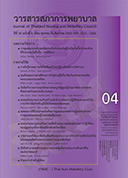Impacts of Health Belief Promoting Programme on Self-Practice Behaviour in Older Patients Having Undergone Hip Arthroplasty
Keywords:
older patients, hip arthroplasty, self- practice behaviour, surgery, Health belief promoting programmeAbstract
Objective: To examine impacts that a health belief promoting programme (HBPP) could have on older patients’ self-practice behaviour after hip arthroplasty
Design: Two-group quasi-experimental research with a pretest and a posttest
Methodology: The sample consisted of 32 older patients diagnosed with hip fractures who had undergone hip arthroplasty. Recruited by means of purposive sampling, the subjects were equally divided into an experimental group and a control group, with each member of one group paired with one of the other based on their age, sex, and education level. The experimental group was treated with the HBPP, which involved promotion of self-efficacy, whilst the control group received only standard care. Data were collected twice, before HBPP and in the fourth week after HBPP, via interviews with the subjects on their post-arthroplasty self-practice behaviour. The data were analysed using Wilcoxon Signed Rank test and Mann-Whitney U test.
Results: In the fourth week after HBPP, a statistically significant difference (z = -4.85; p < .001) was evident between the experimental group’s and the control group’s self-practice behaviours (M = 67.19, SD = 4.43 vs M = 37.99, SD = 4.02). Besides, the experimental group’s fourth-week self-practice behaviour score (M = 67.19, SD = 4.43) was significantly higher (z = -3.52; p < .001) than its pre-experiment score (M = 30.43, SD = 2.59).
Recommendations: As HBPP has the potential to improve older hip arthroplasty patients’ self-practice behaviour, nurses should be specifically trained to apply it to caring for this group of patients.
Downloads
References
Parker MJ. Fracture of the neck of the femur. Los Angeles (CA): SAGE; 2006.
Rao SS, Cherukuri M. Management of hip fracture: the family physician’s role. Am Fam Physician
;73(12):2195-200.
Miller CA. Nursing for wellness in older adults. 5th ed. Philadelphia: Lippincott; 2009.
Thiangwitayaporn S, 50 issues of knee osteoarthritis. Bangkok: Union Creation; 2008. (in Thai)
Christmas C. Medical care of the hip fracture patient. JCG 2006;14(4):40–5.
Meeprasert T. Quality of life of older persons with hip fracture: pre and post-surgery [thesis]. Bangkok: Mahidol Univ; 2007. (in Thai)
Morgan M, Black J, Bone F, Fry C, Harris S, Hogg S. Clinicians-led surgical site infection surveillance
of orthopaedic procedures: a UK multi-center pilot study. J hospital infection 2005;60:201-12.
McLaughlin MA, Orosz GM, Magaziner J, Hannan EL, McGinn T, Morrision RS. Preoperative status
and risk of complication in patients with fracture. JGIM 2006;21: 219-25.
Kenzora JE, Magaziner J, Hudson J, Hebel JR, Young Y, Hawkes W, et al. Outcome after hemiarthroplasty for femoral neck fracture in the elderly. J Clin Orthop Res 1998;348:52-8.
Kanchanasathitkul J. Model development of relative’s participation in rehabilitation among post hip arthroplasty elderly patients [thesis]. Khon Kaen, Khon Kaen Univ.; 2009. (in Thai)
Kadumoung S. Effects of nursing care based on Goal Attainment Theory on post-surgery rehabilitation among elderly patients with hip fracture [thesis]. Chiang Mai: Chiang Mai Univ.; 2008. (in Thai)
Singchalerm T. Effects of information giving on health belief and health behavior among post-arthroscopic surgery elderly patients with knee osteoarthritis [thesis]. Chiang Mai: Chiang Mai Univ.; 1999. (in Thai)
Stretcher VJ, Rosenstock IM. The health belief model. In: Glanz K, Lewis FM, Rimer BK, editors. Health behavior and health education: theory, research, and practice. San Francisco (CA): Jossey-Bass; 1997. p. 41-59.
Muckubphalanonth K, Julamet P, Kungchai W. Effects of self-practice behavior promoting program in post hip arthroplasty elderly patients. Association of Private Higher Education Institutions of Thailand Journals 2012; 18(1):129-44. (in Thai)
Jittapunkul S. Principles of geriatrics. 3rded. Bangkok: Chulalongkorn University; 2001. (in Thai)
Nawinprasert K, Soiwong P, Boonchuong P. Effects of self-efficacy promoting and social support program on treatment compliance and follow-up checking before appointment date among congestive heart failure patients. Nursing Journal 2015;42 Suppl: 11-23. (in Thai)
Prapasin O, Wattana C, Tarawanich T. Effects of self-efficacy enhancement program for self-management on self-management behaviors, obesity, cardiovascular risk, and recovery from metabolic syndrome. Nursing
Journal 2013;40(1):34-48. (in Thai)
Bandura A. Self-efficacy: the exercise of control. New York: W.H. Freeman; 1997.
Wirojyuti S, Kengkarnphanich M, Kengkarnphanich T, Tonsakul S. The effectiveness of rehabilitation program for post hip fracture surgery elderly patients in Phramongkutklao hospital. Journal of The Thai Army Nurses 2014;15(2):187-94. (in Thai)
Wong-ngarm W, Sukumwang K, Nanasin P. Effects of nursing care through support and knowledge giving on self-care behaviors among older persons with hip fracture in recovery period. Nursing J 2014;41(2): 72-82. (in Thai)








